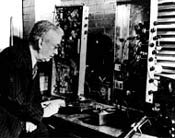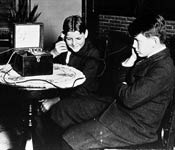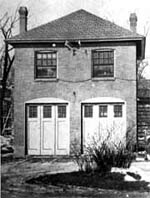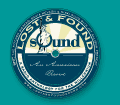Conrad's Garage
Replaying The Earliest Days of Radio
- Produced by Joe Richman

Frank Conrad testing radio equipment in the 1930s.
Photo: Courtesy Westinghouse Historical Center |
Listen in Real Audio:
G2 Sure Stream.
Nov. 30, 2001 -- Back in 1919, listening to radio was more like a science experiment than entertainment. There were no professional radio stations, and most radio receivers were homemade.
But almost every night, 12-year-old Harry Mills would lie in bed and listen to amateur radio operators signal back and forth in the dots and dashes of Morse code. Then one night he heard something different.
Mills, now 94, still recalls the experience with excitement: "I remember it was 10 or 11 o'clock at night and all at once, this voice appears. And I remember letting out a yelp or a shout of some sort and my dad, who had just gotten out of the bath, came in wrapped in a towel to make sure... that something hadn't happened to me. I said, 'Dad, look, I hear this fellow talking.'"
Mills had stumbled onto the experimental transmissions coming from Westinghouse engineer Frank Conrad's garage, 35 miles away near Pittsburgh. It was one thing for Mills to hear Conrad's voice. But he soon heard Conrad playing phonographic music records. "It was astounding," Mills says. "I didn't know you could do that... To add the music, it opens up a whole new world."

Boys listen to an early radio manufactured by Westinghouse in 1921.
Photo: Courtesy Westinghouse Historical Center |
Thomas Edison said: "To invent, you need a good imagination... and a pile of junk." That may help explain why so many important industries were born in a garage: Henry Ford's first automobile, Walt Disney's early cartoons, the first Apple Computer.
Then there's Frank Conrad's garage on the corner of Penn Avenue and Peebles Street, on the outskirts of Pittsburgh. Some people say that's where the modern broadcasting industry began.
In 1920, Conrad's weekly broadcasts from his garage led to the founding of KDKA, widely considered the world's first commercial radio station.
As part of NPR's continuing Lost and Found Sound series, Radio Diaries producer Joe Richman has the story of "Conrad's Garage."

Frank Conrad's garage.
Photo: Courtesy Westinghouse Historical Center |
Other Resources
Radio Diaries Web site
http://www.radiodiaries.org/
Visit the Conrad Project at the National Museum of Broadcasting Web site
http://trfn.clpgh.org/nmb/nmbcproj.htm
View a timeline of radio station KDKA's history
http://www.kdkaradio.com/timeline.html
Read an article about the early days of radio
http://www.cinemedia.net/SFCV-RMIT-Annex/rnaughton/RADIO_WESTINGHOUSE.html
You need the free RealAudio player to listen to audio files.
Copyright © 2001 The Kitchen Sisters
|



